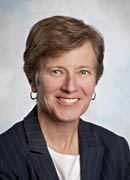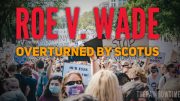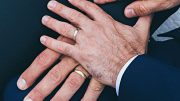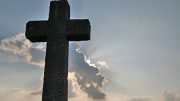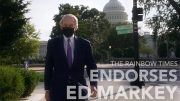By Lisa Keen/Keen News Service—
Renowned Supreme Court advocate Ted Olson remembers the first time he had a chance to argue a case before the U.S. Supreme Court: He didn’t take it.
It was a First Amendment case about billboards in San Diego. Olson had been practicing law for 15 years, he had represented his clients from the start, and they wanted him to argue before the highest court in the land. But Olson and others working on the case agreed their side would benefit by sending up an experienced Supreme Court advocate who was also well known for his expertise in First Amendment issues.
He also remembers several times when the decision over who would argue a case before the Supreme Court did not go smoothly—when various attorneys working on one side of a case couldn’t agree who would present the oral argument. In one case, he remembers, the dispute went so late the Supreme Court clerk threatened to take the argument off the calendar.
When the Sixth Circuit marriage equality cases were before the federal appeals panel last August, one attorney from each of the four plaintiff groups argued before the court. But the Supreme Court has instructed the attorneys to send only two attorneys total to the lectern in April. That means the 36 attorneys currently working on the four cases in four states must decide which two.
And it doesn’t have to be one of them. They could choose to designate an advocate from outside the four legal teams to represent their clients at the nation’s highest court. A number of studies in recent years have shown a dramatic increase in the percentage of Supreme Court arguments delivered by lawyers specializing in Supreme Court cases.
There are many factors the Sixth Circuit marriage attorneys must consider, and some they might consider. For instance, they may grapple over whether to choose openly gay attorneys as one or both of their advocates.
Ruth Harlow, who was legal director for Lambda Legal when the Lawrence v. Texas case was up before the U.S. Supreme Court, said it was a consideration for Lambda in 2003, when it chose openly gay attorney Paul Smith to present its oral argument. Smith had “many years as a Supreme Court advocate,” she noted, as well as many years “standing up before the Court as a known gay man in the inner circle of the Supreme Court bar.”
“Today,” she said, “advocacy on behalf of LGBT clients is much more mainstream.” Attorneys all over the country –straight and gay—have filed lawsuits on behalf of same-sex couples, including nationally prominent attorneys such as Ted Olson and David Boies.
Harlow says she’s hoping the Sixth Circuit marriage attorneys include at least one attorney from the LGBT litigation groups that have been involved in the issue for years.
Of the nine major LGBT-related cases argued at the Supreme Court since 1985, openly gay attorneys have argued five: Mary Dunlap argued for Gay Games organizers in 1987 in SFAA v. U.S. Olympics Committee; John Ward argued for Boston Irish gays in Hurley v. Irish American GLIB in 1995; Evan Wolfson argued for Boy Scout leader James Dale in Boy Scouts v. Dale in 2000; Paul Smith argued against sodomy laws in Lawrence in 2003; and Roberta Kaplan argued against the Defense of Marriage Act in U.S. v. Windsor in 2013.
The other four cases were argued by three straight attorneys: Harvard law professor Laurence Tribe argued both NGTF v. Oklahoma in 1985 and Bowers v. Hardwick in 1986; Jean Dubofsky argued the Colorado Amendment 2 case, Romer v. Evans, in 1996; and Ted Olson argued the California Proposition 8 case, Perry v. Hollingsworth, in 2013.
Nobody working on the Sixth Circuit cases has offered up a name or names of those many potential options, but here’s a short list of possible contenders (in alphabetical order):
Mary Bonauto: She’s gay, highly respected by attorneys straight and gay, and is the best known of the 36 attorneys working on the four marriage cases from the Sixth Circuit appeal. For her two decades of litigation to secure marriage equality, she’s been profiled in the New York Times magazine, awarded a MacArthur Foundation grant, and compared to civil rights giant and former Supreme Court Justice Thurgood Marshall. She is also a much-respected leader in the LGBT community nationwide, long-time civil rights director for Gay & Lesbian Advocates & Defenders, and has as much or more experience than any other attorney in the country in litigating the marriage equality issue specifically. Bonauto does not have any experience arguing before the U.S. Supreme Court, but it was her leadership in the groundbreaking Massachusetts marriage case that got the ball rolling toward marriage equality nationally. Bonauto is co-counsel on the team of private attorneys in the Michigan case, DeBoer v. Snyder.
Jeffrey Fisher: Jeffrey Fisher is a Stanford law professor and an attorney that the Reuters report identified as having the third most experience arguing before the Supreme Court among all 17,000 oral advocates and petitioners. He’s argued 21 cases (winning nine) between 2004 and 2012. A clerk for former Justice John Paul Stevens, he’s co-director of Stanford’s Supreme Court Litigation Clinic and teaches a course called the “Law of Democracy and Supreme Court Decision Making”—the very sort of topic relied on by the Sixth Circuit to say that state bans on same-sex marriage are permissible. Fisher’s Supreme Court experience has focused primarily on rights of arrested persons facing criminal charges, but he was counsel of record in the successful marriage equality case, Bishop v. Smith, from Oklahoma. (The Supreme Court last October denied the appeal of Oklahoma and six other states seeking to defend their bans.) He’s now co-counsel on the Kentucky case, Bourke v. Beshear.
Douglas Hallward-Driemeier: A partner in the prominent conservative-leaning national law firm Ropes & Gray, in Washington, D.C., Hallward-Driemeier is working on the Tennessee case, Tanco v. Haslam. He heads his firm’s Supreme Court practice and, prior to joining the firm, handled Supreme Court litigation for the U.S. Department of Justice. He also served as Assistant to Republican Solicitor General Paul Clement during the administration of President George W. Bush. An article in the Journal of Law for Emory University School of Law said Hallward-Driemeier ranked 26th among the most frequent Supreme Court advocates between 2000 and 2012, having argued 13 cases. (Clement was No. 1, having argued 62 cases at that point. Clement added to that number in 2013 by arguing for the preservation of the Defense of Marriage Act.) Former Lambda legal director Abby Rubenfeld says he’s “a great attorney and very experienced with the Supreme Court, not to mention committed to our issue.”
Ted Olson: Ted’s got cred with the Supreme Court like very few others. During some Republican administrations, he’s reportedly been on short lists as a Supreme Court nominee. As Solicitor General, he’s been the so-called “Tenth Justice.” He’s argued more than 60 cases before the Supreme Court, representing both conservative and liberal positions, and argued the fifth highest number of cases in the past decade (winning 13 of 19), according to Reuters. Notorious swing vote Justice Anthony Kennedy attended his wedding. Olson led and won federal appeals court cases against state marriage bans in two circuits. He argued the Ninth Circuit case, regarding Proposition 8, before the Supreme Court in 2013 and won, albeit on a procedural issue. Aside from his credentials at the Supreme Court, he’s become a prominent advocate for marriage equality in the media, at some cost to his reputation among conservatives. He’s worked closely with LGBT legal groups on the previous marriage cases—in California and Virginia.
Paul M. Smith: Openly gay attorney Paul Smith successfully argued the landmark 2003 case, Lawrence v. Texas, which struck down laws prohibiting sexual activity between same-sex partners. He served as clerk to former Supreme Court Justice Lewis Powell during the 1980-81 session (years prior to the court’s Bowers v. Hardwick decision upholding sodomy laws) and has argued 15 times before the high court. Currently, he is a partner at the Jenner & Block law firm in Washington, D.C., and chief of the firm’s Supreme Court Practice. He also serves on Lambda Legal’s National Leadership Council and was formerly co-chair of its Board of Directors. Primarily citing his argument in Lawrence, the American Bar Association’s Section of Individual Rights and Responsibilities recognized him with its prestigious “Thurgood Marshall Award” in 2010, the same year the National Law Journal named him as one of four of the “Decade’s Most Influential Lawyers” in civil rights litigation.
These are some good guesses; there are plenty more who could fit the bill. There are openly gay Supreme Court “repeat litigators” Pamela Karlan and Kathleen Sullivan, both with enough experience and reputation to have been considered on Supreme Court nominee short lists. According to Reuters, Karlan has won two of her five cases before the Supreme Court; Sullivan has won four of six.
Evan Wolfson, who litigated the first gay marriage trial (in Hawaii) and has led a national grassroots effort to establish a political and cultural atmosphere to bolster the legal prospects, is another possibility. He argued in the Supreme Court on behalf of Boy Scout leader James Dale.
And Roberta Kaplan, who is also openly gay, successfully argued the U.S. v. Windsor case that overturned the key provision of the Defense of Marriage Act.
“Ultimately,” noted Olson, “the client gets to decide. And if a conflict does develop between what a client wants and what’s best for a whole class of people, it will be up to their personal lawyers on the case to help them make the best decision.
“In a situation with disparate clients in disparate states, with clients feeling loyalty to their lawyers, it’s not going to be simple,” said Olson. “The lawyers are going to have to exercise some substantial degree of maturity and selflessness. But I think they’re a sophisticated bunch….I hope they’ll be able to put themselves aside and say this could be the final victory for gays and lesbians.”
© copyright 2015 by Keen News Service. All rights reserved.

